Related Research Articles
Jazz is a music genre that originated in the African-American communities of New Orleans, Louisiana, United States, in the late 19th and early 20th centuries, with its roots in blues and ragtime. Since the 1920s Jazz Age, it has been recognized as a major form of musical expression in traditional and popular music, linked by the common bonds of African-American and European-American musical parentage. Jazz is characterized by swing and blue notes, complex chords, call and response vocals, polyrhythms and improvisation. Jazz has roots in European Harmony and African rhythmic rituals.

Louis Daniel Armstrong, nicknamed "Satchmo", "Satch", and "Pops", was an American trumpeter and vocalist. He is among the most influential figures in jazz. His career spanned five decades and different eras in the history of jazz.

In vocal jazz, scat singing is vocal improvisation with wordless vocables, nonsense syllables or without words at all. In scat singing, the singer improvises melodies and rhythms using the voice as an instrument rather than a speaking medium. This is different from vocalese, which uses recognizable lyrics that are sung to pre-existing instrumental solos.
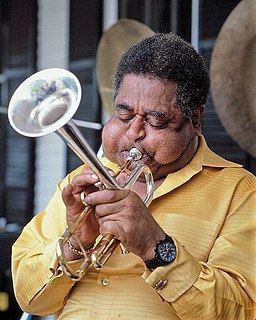
John Birks "Dizzy" Gillespie was an American jazz trumpeter, bandleader, composer, educator and singer. He was a trumpet virtuoso and improviser, building on the virtuoso style of Roy Eldridge but adding layers of harmonic and rhythmic complexity previously unheard in jazz. His combination of musicianship, showmanship, and wit made him a leading popularizer of the new music called bebop. His beret and horn-rimmed spectacles, scat singing, bent horn, pouched cheeks, and light-hearted personality provided one of bebop's most prominent symbols.

Jazz fusion is a music genre that developed in the late 1960s when musicians combined jazz harmony and improvisation with rock music, funk, and rhythm and blues. Electric guitars, amplifiers, and keyboards that were popular in rock and roll started to be used by jazz musicians, particularly those who had grown up listening to rock and roll.
Latin jazz is a genre of jazz with Latin American rhythms. The two main categories are Afro-Cuban jazz, rhythmically based on Cuban popular dance music, with a rhythm section employing ostinato patterns or a clave, and Afro-Brazilian jazz, which includes samba and bossa nova.
Vocalese is a style or musical genre of jazz singing in which words are added to an instrumental soloist's improvisation.

Ramón "Mongo" Santamaría Rodríguez was a Cuban percussionist and bandleader who spent most of his career in the United States. Primarily a conga drummer, Santamaría was a leading figure in the pachanga and boogaloo dance crazes of the 1960s. His biggest hit was his rendition of Herbie Hancock's "Watermelon Man", which was inducted into the Grammy Hall of Fame in 1998. From the 1970s, he recorded mainly salsa and Latin jazz, before retiring in the late 1990s.
"Take the 'A' Train" is a jazz standard by Billy Strayhorn that was the signature tune of the Duke Ellington orchestra.
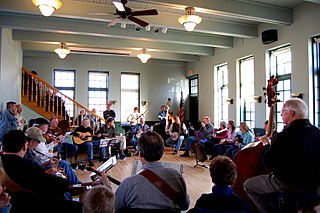
A jam session is a relatively informal musical event, process, or activity where musicians, typically instrumentalists, play improvised solos and vamp on tunes, songs, and chord progressions. To "jam" is to improvise music without extensive preparation or predefined arrangements, except for when the group is playing well-known jazz standards or covers of existing popular songs. Original jam sessions, also called "free flow sessions," are often used by musicians to develop new material (music) and find suitable arrangements. Both styles can be used simply as a social gathering and communal practice session. Jam sessions may be based upon existing songs or forms, may be loosely based on an agreed chord progression or chart suggested by one participant, or may be wholly improvisational. Jam sessions can range from very loose gatherings of amateurs to evenings where a jam session coordinator or host acts as a "gatekeeper" so that appropriate-level performers take the stage to sophisticated improvised recording sessions by professionals which are intended to be broadcast live on radio or TV or edited and released to the public.
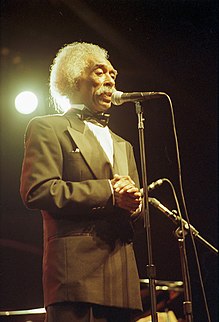
Gerald Stanley Wilson was an American jazz trumpeter, big band bandleader, composer, arranger, and educator. Born in Mississippi, he was based in Los Angeles from the early 1940s. In addition to being a band leader, Wilson wrote arrangements for Duke Ellington, Sarah Vaughan, Ray Charles, Julie London, Dizzy Gillespie, Ella Fitzgerald, Benny Carter, Lionel Hampton, Billie Holiday, Dinah Washington, and Nancy Wilson.
Seattle is the largest city in the U.S. state of Washington and has long played a major role in the state's musical culture, popularizing genres of alternative rock such as grunge and being the origin of major bands like Alice in Chains, Soundgarden, Pearl Jam, Foo Fighters. The city remains home to several influential bands, labels, and venues.

Jazz improvisation is the spontaneous invention of melodic solo lines or accompaniment parts in a performance of jazz music. It is one of the defining elements of jazz. Improvisation is composing on the spot, when a singer or instrumentalist invents melodies and lines over a chord progression played by rhythm section instruments and accompanied by drums. Although blues, rock, and other genres use improvisation, it is done over relatively simple chord progressions which often remain in one key.
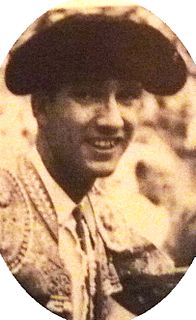
Carlos Arruza, born Carlos Ruiz Camino, was one of the most prominent bullfighters of the 20th century. He was known as "El Ciclón".
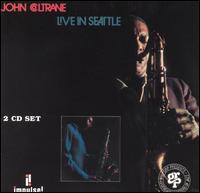
Live in Seattle is a live double album by jazz saxophonist John Coltrane, recorded in 1965 and released posthumously in 1971 on the Impulse! label. The original Double LP issue was expanded to 2 CDs for the reissue.
Bobby Durham was an American jazz drummer.
Oscar Brashear is an American jazz trumpeter and session musician from Chicago, Illinois.
Francisco Fellove Valdés, also known as El Gran Fellove, was a Cuban songwriter and singer. A prolific composer of the feeling generation, he is well known for his particular style of scat singing known as chua chua. He is the author of the famous guaracha-pregón "Mango mangüé", recorded by Machito and Celia Cruz among others. He was the cousin of conga drummer Carlos "Patato" Valdés.
"The Mooche" is an American jazz song, composed in 1928 by Duke Ellington and Irving Mills, with scat singing by vocalist Gertrude "Baby" Cox. The song is considered to be one of Ellington's signature pieces and "he performed it frequently and recorded it many times over 45 years."
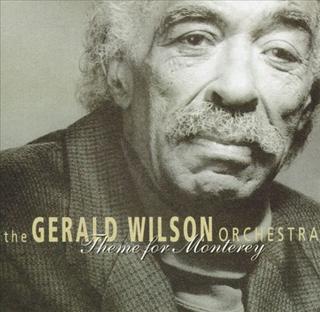
Theme for Monterey is an album by the Gerald Wilson Orchestra recorded in 1997 and released on the MAMA label.